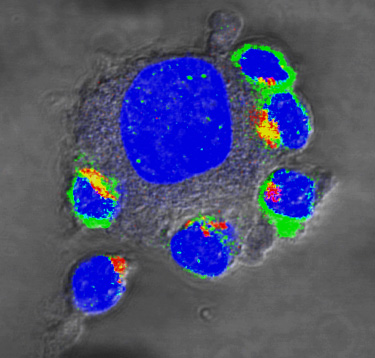
Breakthrough T-Cell Therapy Approach Offers Hope for Cancer Treatment

T cells attack a tumor cell and secrete lytic proteins (red/yellow) in order to destroy it.
Source: Helmholtz Zentrum München
With numerous different entities and millions of people affected, cancer continues to be one of the most prevalent diseases around the world. Scientists are working to find new treatment possibilities, and have been concentrating on the body’s own immune system for some time.
“Because cancer emerges from the body’s own cells, it is usually difficult for the immune system to distinguish good cells from bad ones,” explains Prof. Dr. Elfriede Nößner, head of the Tissue Control of Immunocytes Research Group at the Helmholtz Zentrum München. “But there are ways to support the immune system in recognizing and combating cancer cells.”
Focus on T-cell therapy
One approach is the so-called adoptive T-cell therapy, which involves removing immune cells from the body and genetically arming them. The cells are given new structures on the surface that accurately lead them to the cancer cells.
One limitation in this form of therapy is that the binding between the immune cell and the cancer cell is often somewhat weak. “Although this binding can be artificially strengthened, doing so also increases the risk of unwanted binding to healthy structures in the body,” explains study leader Nößner. She and her team were therefore searching for a different way to improve the defense provided by the immune cells.
Attack instead of sleep mode
In the current work, the researchers present a new surface molecule which comprises two halves. On the outside, it preferentially binds to the PD-L1 molecule, which tumor cells often form in order to thwart the attacking immune cells. On the inside of the T-cells, however, this binding does not activate a sleep mode (which the natural protein would do), and instead activates the T-cell’s killer program, making it especially aggressive. Experimental models showed that T-cells armed in this way proliferate more strongly in the tumors and destroyed more tumor cells.
The next step will be to confirm the findings in clinical studies. “If that step succeeds, the approach would enlarge the arsenal of T-cells suitable for adoptive T-cell therapy,” Elfriede Nößner states. “This could not only make the treatment more effective but would allow it to be used in more patients in the framework of personalized medicine.”
Further Information
The work was the result of close cooperation with the team headed by Dr. Matthias Leisegang from the Institute of Immunology at the Charité Berlin Buch Campus and Prof. Dr. Dolores J. Schendel, CEO and CSO at Medigene AG. The authors Ramona Schlenker, Luis Felipe Olguin Contreras, Anja Disovic and Julia Schnappinger attend the Helmholtz Graduate School Environmental Health, or HELENA for short.
Original Publication:
Schlenker, R. et al. (2017): Chimeric PD-1:28 receptor upgrades low-avidity T cells and restores effector function of tumor-infiltrating lymphocytes for adoptive cell therapy. Cancer Research, DOI: 10.1158/0008-5472.CAN-16-1922
The Helmholtz Zentrum München, the German Research Center for Environmental Health, pursues the goal of developing personalized medical approaches for the prevention and therapy of major common diseases such as diabetes and lung diseases. To achieve this, it investigates the interaction of genetics, environmental factors and lifestyle. The Helmholtz Zentrum München is headquartered in Neuherberg in the north of Munich and has about 2,300 staff members. It is a member of the Helmholtz Association, a community of 18 scientific-technical and medical-biological research centers with a total of about 37,000 staff members. http://www.helmholtz-muenchen.de/en
Contact for the media:
Department of Communication, Helmholtz Zentrum München – German Research Center for Environmental Health, Ingolstädter Landstr. 1, 85764 Neuherberg – Tel. +49 89 3187 2238 – Fax: +49 89 3187 3324 – E-mail: presse@helmholtz-muenchen.de
Scientific Contact:
Prof. Dr. Elfriede Nößner, Helmholtz Zentrum München – German Research Center for Environmental Health, Immunoanalytics – Research Group Tissue Control of Immunocytes & Core Facility, Marchioninistr. 25, 81377 München – Tel. +49 89 3187 1303 – E-mail: noessner@helmholtz-muenchen.de
http://www.helmholtz-muenchen.de/en/press-media/press-releases/all-press-releases/index.html – read more news of Helmholtz Zentrum München












